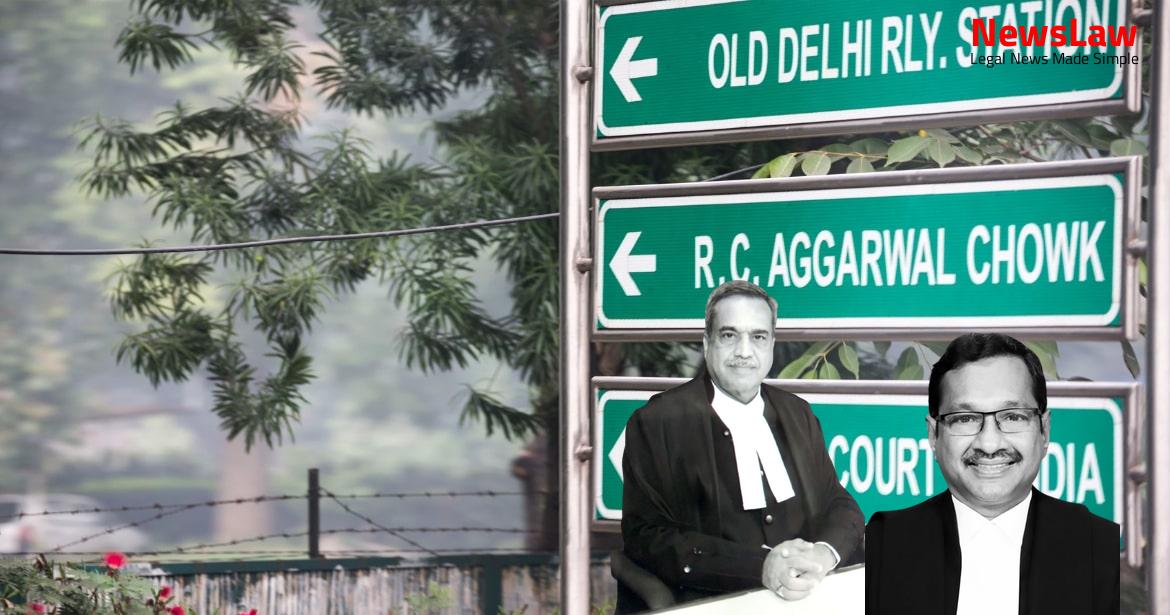In the realm of higher education, the courts’ meticulous legal analysis underscores the critical need for compliance in Vice-Chancellor appointments. This blog delves into the court’s emphasis on upholding regulations and statutory provisions to ensure that the selection process aligns with established criteria. Explore how the legal framework safeguards the integrity and competence of academic leadership within universities.
Facts
- The appellant is aggrieved by the judgment and order of the High Court of Kerala which dismissed the writ appeal and review petition regarding the appointment of the Vice Chancellor of APJ Abdul Kalam Technological University.
- The Division Bench confirmed the decision of the Single Judge to not issue a writ of quo warranto declaring the appointment void ab initio.
- The appellant has filed the present appeals to challenge this decision.
- The respondents argued that the petitioners lack standing to bring the writ petition
- It was contended that the petition was based on conjecture and not on actual violation of rights
- The respondents claimed that the actions in question were in compliance with the law
- They argued that there was no merit in the petition and it should be dismissed
Also Read: Quashing of Enhanced Tuition Fee in Private Medical Colleges
Issue
- Appointment of Respondent 4 as Vice-Chancellor of the SP University may be contrary to statutory provisions.
- Respondent 4’s eligibility criteria for the post of Vice-Chancellor is in question.
- State cannot refuse to accept the amendment to the UGC Regulations as a ground for non-binding adoption.
- UGC Regulations apply to Vice Chancellor appointments in State Universities.
- The Search Committee for recommending the appointment of respondent No. 1 as Vice Chancellor must be duly constituted as per UGC Regulations and relevant state laws.
Also Read: Final Decision and Disclosure in Collegium Meetings
Arguments
- The appellant filed a writ petition seeking a writ of quo warranto to declare the appointment of respondent No 1 as Vice Chancellor of APJ Abdul Kalam Technological University void ab initio.
- The appointment was challenged on grounds of non-compliance with UGC Regulations, improper composition of the Search Committee, and failure to recommend a panel of candidates as required by UGC Regulations.
- It was argued that any appointment contrary to the UGC Regulations is void ab initio.
- The Single Judge opined that since the Search Committee was constituted as per the University Act, the appointment cannot be deemed illegal.
- The appellant contended that the UGC Regulations should prevail over State legislation, especially since the Regulations were adopted by the State Government.
- The Division Bench dismissed the appeal based on the lack of adoption of UGC Regulation amendments, leading to the present appeals.
- The Search Committee constituted in the present case is not contrary to UGC Regulations as per UGC Regulations, 2013.
- The Hon’ble High Court rightfully refused to issue a writ of quo warranto based on the decision in the case of Kalyani Mathivanan (supra).
- The member nominated by AICTE can be considered a person of eminence in higher education.
- The Search Committee consisted of one member nominated by AICTE and the Chief Secretary of the State.
Also Read: Quashing of High Court Order in Nagpur Metro Rail Corporation v. Tourism Corporation Case
Analysis
- Appointment of Vice-Chancellor must comply with prevailing UGC Regulations or University Act, 2015 (State Act)
- Central legislation prevails over State legislation in case of conflict, as per Article 254 of the Constitution
- Search Committee must consider academic excellence, exposure to higher education, and administrative experience in recommending candidates
- Selection of Vice-Chancellor is a crucial decision for a university’s governing body
- Various Commission Reports emphasize the importance of selecting the right Vice-Chancellor
- UGC Regulations, being subordinate legislation, become part of the Act and must be followed
- Role of Vice-Chancellor as per various Commission Reports includes being a leader, liaison with the public, and maintaining university standards
- Appointment of Vice-Chancellor made in violation of UGC Regulations or State Act is considered void ab initio
- Search Committee’s role is crucial in selecting Vice-Chancellor, its composition and recommendations are significant
- Importance of a Visionary and Academic Leader as Vice-Chancellor, with appropriate academic and administrative experience
- The Vice-Chancellor should be a distinguished educationist from the higher education system with the highest level of competence, integrity, morals, and self-respect.
- The Ramlal Parikh Committee in 1993 emphasized the need for distinguished and dignified individuals as Vice-Chancellors to be treated with the dignity and regard the office merits.
- The University Grants Commission’s handbook titled Governance in Higher Education outlines the critical role of Vice-Chancellors in implementing national higher education policies, institutional reform, quality enhancement, and engagement with scholars.
- The Vice-Chancellor is expected to lead the university with attributes like team-building, strategic planning, and adherence to governance principles.
- The appointment of a Vice-Chancellor must comply with applicable UGC Regulations, even if State Acts have less stringent eligibility criteria.
- Court decisions have established that UGC Regulations take precedence over State legislation in Vice-Chancellor appointments.
- The importance of the Vice-Chancellor’s position has been extensively discussed in court rulings, emphasizing compliance with UGC Regulations for appointments to be valid.
- The Vice-Chancellor is the principal executive and academic officer of the University.
- The appointment of the Vice-Chancellor is subject to the individual being below sixty one years of age.
- The first Vice-Chancellor is appointed by the Chancellor on the recommendation of the Government, and subsequent appointments are made by the Chancellor from a panel of names recommended by a Search Committee.
- The Search Committee consists of members elected by the Board of Governors, nominated by the AICTE, and the Chief Secretary of the State as the Convenor.
- The process of preparing a panel for the appointment of the Vice-Chancellor must begin at least three months before the expected occurrence of the vacancy.
- The appointed Vice-Chancellor holds office for a period of four years from the date of entry into office or until reaching the age of sixty five, whichever comes earlier.
Case Title: PROFESSOR (DR) SREEJITH P.S Vs. DR. RAJASREE M.S. (2022 INSC 1137)
Case Number: C.A. No.-007634-007635 / 2022



